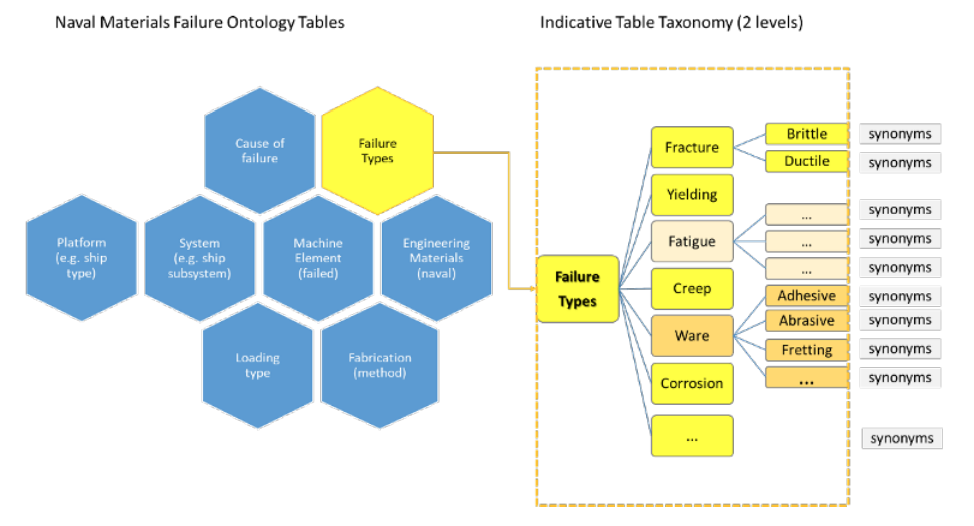Difference between revisions of "Template:Article of the week"
Shawndouglas (talk | contribs) (Updated article of the week text) |
Shawndouglas (talk | contribs) (Updated article of the week text) |
||
| Line 1: | Line 1: | ||
<div style="float: left; margin: 0.5em 0.9em 0.4em 0em;">[[File:Fig2 | <div style="float: left; margin: 0.5em 0.9em 0.4em 0em;">[[File:Fig2 Melanitis MATECWebConf21 349.png|240px]]</div> | ||
'''"[[Journal: | '''"[[Journal:Designing a knowledge management system for naval materials failures|Designing a knowledge management system for naval materials failures]]"''' | ||
Implemented materials fail from time to time, requiring [[failure analysis]]. This type of scientific analysis expands into [[Forensic science|forensic]] engineering for it aims not only to identify individual and symptomatic reasons for failure, but also to assess and understand repetitive failure patterns, which could be related to underlying material faults, design mistakes, or maintenance omissions. Significant [[information]] can be gained and studied from carefully documenting and managing the data that comes from failure analysis of materials, including in the naval industry. The NAVMAT research project, presented herein, attempts an interdisciplinary approach to [[materials informatics]] by integrating materials engineering and [[Informatics (academic field)|informatics]] under a platform of [[Information management|knowledge management]]. Our approach utilizes a focused, common-cause failure analysis methodology for the naval and marine environment. The platform's design is dedicated to the effective recording, efficient indexing, and easy and accurate retrieval of relevant information, including the associated history of maintenance and secure operation concerning failure incidents of marine materials, components, and systems in an organizational fleet. ... ('''[[Journal:Designing a knowledge management system for naval materials failures|Full article...]]''')<br /> | |||
<br /> | <br /> | ||
''Recently featured'': | ''Recently featured'': | ||
{{flowlist | | {{flowlist | | ||
* [[Journal:Laboratory information management system for COVID-19 non-clinical efficacy trial data|Laboratory information management system for COVID-19 non-clinical efficacy trial data]] | |||
* [[Journal:Improving data quality in clinical research informatics tools|Improving data quality in clinical research informatics tools]] | * [[Journal:Improving data quality in clinical research informatics tools|Improving data quality in clinical research informatics tools]] | ||
* [[Journal:Electronic tools in clinical laboratory diagnostics: Key examples, limitations, and value in laboratory medicine|Electronic tools in clinical laboratory diagnostics: Key examples, limitations, and value in laboratory medicine]] | * [[Journal:Electronic tools in clinical laboratory diagnostics: Key examples, limitations, and value in laboratory medicine|Electronic tools in clinical laboratory diagnostics: Key examples, limitations, and value in laboratory medicine]] | ||
}} | }} | ||
Revision as of 16:29, 27 February 2023
"Designing a knowledge management system for naval materials failures"
Implemented materials fail from time to time, requiring failure analysis. This type of scientific analysis expands into forensic engineering for it aims not only to identify individual and symptomatic reasons for failure, but also to assess and understand repetitive failure patterns, which could be related to underlying material faults, design mistakes, or maintenance omissions. Significant information can be gained and studied from carefully documenting and managing the data that comes from failure analysis of materials, including in the naval industry. The NAVMAT research project, presented herein, attempts an interdisciplinary approach to materials informatics by integrating materials engineering and informatics under a platform of knowledge management. Our approach utilizes a focused, common-cause failure analysis methodology for the naval and marine environment. The platform's design is dedicated to the effective recording, efficient indexing, and easy and accurate retrieval of relevant information, including the associated history of maintenance and secure operation concerning failure incidents of marine materials, components, and systems in an organizational fleet. ... (Full article...)
Recently featured:










